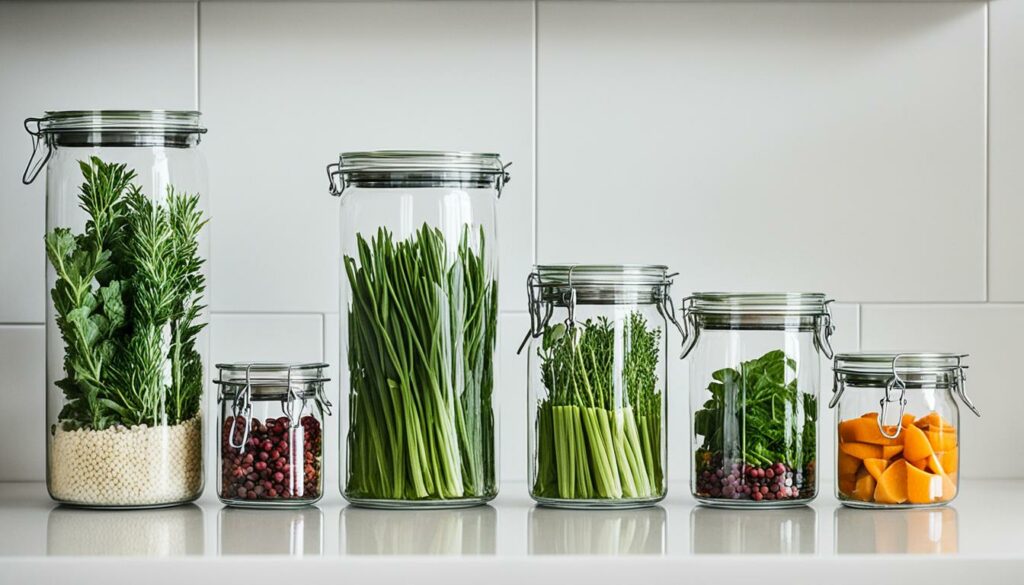Imagine this: It’s a beautiful summer day, and you’re enjoying a picnic in the park with your friends. As you unpack your delicious homemade sandwiches, you can’t help but notice that everyone else has plastic containers and disposable utensils. The sight of all that waste makes you cringe. You realize that there must be a better way to enjoy your meal while being kind to the planet.
Welcome to the world of eco-friendly swaps and sustainable alternatives. In today’s fast-paced society, it’s easy to overlook the impact our choices have on the environment. But by making simple changes, we can reduce our carbon footprint and contribute to a greener future. Whether it’s replacing single-use plastic with reusable options or finding earth-conscious substitutes for everyday products, there are countless eco-friendly alternatives available.
Throughout this article, we will explore a wide range of environmentally friendly solutions and sustainable living alternatives. From the kitchen to the bathroom and even on-the-go, we’ll discover how small changes can make a big difference. So let’s dive in and uncover the world of eco-conscious product alternatives and sustainable swaps that can help us create a more ecofriendly lifestyle.
Understanding the Zero Waste Movement
The zero waste movement is gaining momentum as individuals around the world strive to reduce waste and adopt a waste-free lifestyle. This eco-conscious movement encourages sustainable practices and waste management strategies to minimize our environmental footprint.
By understanding the principles of the zero waste movement, we can make conscious choices in our daily lives to reduce waste and contribute to a more sustainable future. Here are some key aspects of the zero waste movement:
- Reducing Waste: One of the main goals of the zero waste movement is to minimize the amount of waste we produce. This involves avoiding single-use items, recycling and repurposing materials, and making informed purchasing decisions.
- Embracing a Waste-Free Lifestyle: Adopting a waste-free lifestyle means prioritizing reusable products over disposable ones. By opting for reusable items like cloth bags, bottles, and straws, we can significantly reduce the amount of waste we generate.
- Implementing Sustainable Practices: The zero waste movement promotes sustainable practices such as composting, recycling, and upcycling. These practices help divert waste from landfills and contribute to a circular economy.
- Effective Waste Management: Proper waste management is a crucial aspect of the zero waste movement. This includes responsibly disposing of waste, reducing food waste, and advocating for sustainable waste management systems in our communities.
By embracing the principles of the zero waste movement, we can make a positive impact on the environment and contribute to a more sustainable future. Let’s explore practical tips and strategies for reducing waste and adopting a waste-free lifestyle in the following sections.
Begin Your Eco-Friendly Journey in the Kitchen
Glass Containers vs. Plastic: A Clear Choice for Storage
When it comes to sustainable kitchen practices, one of the easiest switches you can make is opting for glass containers instead of plastic. Not only are glass containers more eco-friendly, but they also offer numerous benefits for food storage. Glass is a non-toxic, non-porous material that doesn’t leach harmful chemicals into your food, ensuring that your meals stay fresh and safe.
Glass containers are also known for their durability. Unlike plastic containers that degrade over time and can leach chemicals, glass containers can withstand high temperatures, allowing them to be used in the oven, microwave, and freezer. This versatility eliminates the need for multiple storage containers, simplifying your kitchen storage and reducing waste.
By using glass containers, you contribute to a plastic-free kitchen, reducing single-use plastics and minimizing your carbon footprint. These sustainable kitchen storage solutions not only benefit the environment but also help to keep your kitchen organized and aesthetically pleasing. Say goodbye to mismatched plastic containers and hello to a clutter-free, eco-friendly kitchen!

From Paper to Durability: Reusable Beeswax Wraps
Another eco-friendly and sustainable food storage option is reusable beeswax wraps. These wraps are made from natural materials such as cotton fabric coated with a mixture of beeswax, tree resin, and jojoba oil. They are a great alternative to single-use plastic wrap or aluminum foil, which contribute to plastic waste and environmental pollution.
Reusable beeswax wraps are not only biodegradable but also versatile and easy to use. They can be molded and shaped around various food items, creating an airtight seal that keeps your food fresh. Whether you’re wrapping sandwiches, leftovers, or fruits, beeswax wraps are an effective and sustainable solution for food storage.
When it’s time to clean your beeswax wrap, simply wash it with cool water and mild soap and let it air dry. With proper care, these wraps can be reused for up to a year, reducing plastic waste and eliminating the need for single-use food wraps.
The Simple Switch to Compostable Kitchen Scraps
Composting kitchen scraps is not only an eco-friendly solution but also an excellent way to reduce food waste and create nutrient-rich soil for sustainable gardening. Instead of throwing away organic waste, such as fruit and vegetable peels, coffee grounds, and eggshells, you can transform them into a valuable resource.
Starting a composting system in your kitchen is simple and rewarding. Begin by setting up a compost bin or container and collect your kitchen scraps in a separate compost bin. It’s important to avoid meat, dairy, and oily foods, as they can attract pests or create unpleasant odors. Instead, focus on collecting fruit and vegetable scraps, coffee grounds, tea bags, and other organic waste.
Regularly turn and mix your compost pile to promote decomposition and prevent odors. Over time, your kitchen scraps will break down into nutrient-rich compost that can be used to nourish your garden soil, promoting healthy plant growth and reducing the need for chemical fertilizers.
By adopting these sustainable kitchen practices, you can make a significant difference in reducing plastic waste, minimizing your carbon footprint, and creating a more eco-friendly lifestyle.
Transform Your Bathroom Into a Sustainable Sanctuary
In the pursuit of a more sustainable lifestyle, it’s essential to extend our eco-friendly practices beyond the kitchen. Creating a sustainable bathroom not only reduces waste but also promotes a more conscious approach to personal care. By making simple changes and choosing eco-friendly options, we can transform our bathrooms into sanctuaries of sustainability.
When it comes to personal care items, opting for eco-friendly alternatives is key. Look for shampoo, conditioner, soap, and toothpaste that are packaged in sustainable materials and free from harmful chemicals. There are numerous green beauty brands available that prioritize the use of environmentally conscious ingredients and sustainable packaging. By choosing these green beauty products, you can further support a sustainable bathroom.
Avoiding single-use plastic in the bathroom is another important step towards sustainability. Swap plastic toothbrushes for bamboo alternatives, which are biodegradable and renewable. Replace disposable razors with a safety razor that allows for blade replacements, reducing plastic waste. Consider using refillable containers for liquid soaps and lotions, eliminating the need for single-use plastic bottles.
A plastic-free bathroom also means rethinking our daily routines. Invest in reusable cotton rounds or makeup remover cloth pads to replace disposable cotton balls or wipes. This small change can significantly reduce waste and eliminate the need for single-use products. Additionally, choose eco-friendly alternatives for menstrual care, such as menstrual cups or reusable cloth pads, to reduce the environmental impact of traditional disposable products.
By transforming our bathrooms into sustainable sanctuaries, we contribute to the overall reduction of waste and promote a more eco-friendly lifestyle. Remember, every small change counts, and even the smallest swaps can make a significant difference when it comes to creating a greener future.
Elevating Your Cleaning Routine with Green Product Replacements
Transitioning to green cleaning products and sustainable cleaning practices is not only beneficial for the environment but also for your health. By opting for eco-friendly cleaners and natural cleaning solutions, you can reduce your exposure to harmful chemicals and create a safer living environment.
DIY Eco-Friendly Cleaners: Effective and Simple Recipes
One of the easiest ways to incorporate green cleaning into your routine is by making your own DIY cleaning solutions using natural ingredients. Not only are homemade cleaners effective in removing dirt and grime, but they are also affordable and gentle on the environment. Here are a few simple and effective recipes to try:
- All-Purpose Cleaner: Mix equal parts water and white vinegar in a spray bottle. Add a few drops of your favorite essential oil for a pleasant scent.
- Glass Cleaner: Combine 1 cup of water, 1 cup of rubbing alcohol, and 1 tablespoon of white vinegar in a spray bottle. Shake well before use.
- Countertop Disinfectant: Mix 1/2 cup of hydrogen peroxide, 1/2 cup of distilled water, and the juice of half a lemon in a spray bottle. This solution is effective in killing bacteria and germs.
These DIY cleaning solutions not only provide an eco-friendly alternative to conventional cleaners but also allow you to control the ingredients and customize scents according to your preference.
Ditching Disposables: Cloth Rags and Microfiber Towels
Another sustainable cleaning practice is to replace disposable cleaning products with reusable alternatives. By swapping out paper towels and disposable wipes for cloth rags and microfiber towels, you can significantly reduce waste and save money in the long run.
Cloth rags can be made from old t-shirts or towels, providing a durable and eco-friendly option for wiping surfaces and cleaning spills. Microfiber towels are particularly effective in trapping dust and dirt, making them a great choice for dusting and polishing surfaces with minimal effort. These reusable cleaning cloths can be easily washed and reused, reducing waste and minimizing the use of single-use cleaning products.
By incorporating these eco-friendly cleaning ingredients and tools into your routine, you can elevate your cleaning practices while minimizing your environmental impact. Not only will you be contributing to a healthier planet, but you’ll also enjoy the benefits of a clean and sustainable home.
| Eco-Friendly Cleaning Products | Benefits |
|---|---|
| Natural cleaning solutions | – Free from harsh chemicals |
| Homemade cleaners | – Affordable and customizable |
| Reusable cleaning cloths | – Reduce waste |
| Microfiber towels | – Trap dust and dirt effectively |
| Eco-friendly cleaning tools | – Environmentally conscious |
| Sustainable cleaning supplies | – Minimize environmental impact |
Sustainable Alternatives to Everyday Products for On-the-Go Convenience
In today’s fast-paced world, it’s important to make sustainable choices even when we’re on the move. By opting for eco-friendly travel essentials and green alternatives for convenience, we can reduce our environmental impact and contribute to a greener future. This section will explore sustainable on-the-go products that provide practical and eco-conscious solutions for our everyday needs.
Reusable Mugs and Bottles: Your Partners in Hydration
Say goodbye to single-use coffee cups and plastic water bottles. Reusable mugs and bottles are excellent alternatives that not only help reduce waste but also keep your beverages at the perfect temperature. Choose from a variety of stylish and durable options made from materials like stainless steel or glass. With sustainable hydration solutions, you can enjoy your favorite drinks while making a positive impact on the environment.
Eco-Conscious Product Alternatives: Totes, Straws, and Utensils
Eliminating single-use plastics is a crucial step towards a sustainable future. By replacing disposable items with eco-friendly alternatives, such as reusable totes, straws, and utensils, we can significantly reduce our plastic waste. Invest in a sturdy and stylish tote bag for your shopping needs, carry a reusable straw for your beverages, and bring your own utensils when eating on-the-go. These small changes can make a big difference in protecting our planet.
| Product | Description | Sustainability Features |
|---|---|---|
| Reusable Tote Bags | Durable and spacious bags made from eco-friendly materials such as organic cotton or recycled materials. | Eliminates the need for disposable plastic bags, reducing plastic waste. |
| Eco-Friendly Straws | Straws made from sustainable materials like stainless steel, bamboo, or silicone. | Reusable and easy to clean, reducing single-use plastic straw consumption. |
| Sustainable Utensils | Compact and lightweight utensil sets made from materials like bamboo or stainless steel. | Eliminates the need for disposable plastic utensils, reducing plastic waste. |
By incorporating these sustainable alternatives into our daily routines, we can embrace a greener lifestyle and contribute to a cleaner and healthier planet for future generations.
Conclusion
Throughout this article, we have explored the importance of eco-friendly swaps and sustainable alternatives in various aspects of our lives. By making conscious choices, we can contribute to a greener future and create a positive impact on our environment.
Adopting a green lifestyle is not only beneficial for the planet but also for ourselves. By reducing waste, choosing environmentally friendly products, and embracing sustainable practices, we can improve our overall well-being and create a healthier living space.
It is essential to prioritize environmental consciousness in our daily lives. Whether it’s using glass containers instead of plastic, opting for reusable beeswax wraps, composting kitchen scraps, or choosing eco-friendly personal care items, every small step counts.
Let us empower ourselves to make sustainable changes and be mindful of the choices we make. By embracing eco-friendly swaps and sustainable alternatives, we can pave the way for a greener future and inspire others to join us on this journey towards a more sustainable and earth-conscious lifestyle.


